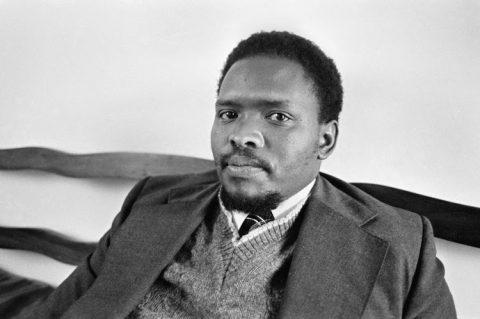
Bantu Steve Biko’s death helped raise awareness of the ills of apartheid
Seriously injured from a beating received at the hands of police interrogators, the prisoner was loaded into the back of a Land Rover. The 12-hour trip from Port Elizabeth to a prison hospital in Pretoria was more than 1000km.
When he arrived he was dumped in a prison cell where he died, 40 years ago today. The man was Bantu Steve Biko, a black anti-apartheid activist, the 11th person to die in police custody in South Africa that year. He would not be the last but his death sparked outrage around the world and became a symbol of all that was wrong with apartheid.
His name became almost as familiar as Nelson Mandela’s in the years after his death. And his story became well known when it was told in the 1987 biography, Biko, written by journalist and friend Donald Woods, which became the basis of the film Cry Freedom, starring Denzel Washington as Biko. Bantu Stephen Biko was born in 1946 in Tarkastad in South Africa, son of policeman Mzingaye Mathew Biko. The family later moved to King Williams Town where Mzingaye left the police force, took a job as a clerk and began studying law.

When Mzingaye died in 1950 the family became dependent on his mother Alice “Mamcete” Biko, a domestic servant and cook. She worked in white people’s homes, making Biko aware of the different conditions between blacks and whites in South Africa, kindling his political awareness.
Biko was a bright student, but was expelled from a prestigious boarding school in 1964 for his suspected links to the Azanian People’s Liberation Army, known as Poqo, which was connected to the banned Pan African Congress.
In 1966 he went to the University of Natal medical school where he joined the National Union of South African Students (NUSAS), which was dominated by white students but espoused a policy of multiracialism. In 1968 he founded the South African Students’ Organisation (SASO), a blacks-only organisation, which became concerned with raising the political awareness of blacks in South Africa, becoming known as a spearhead of the Black Consciousness Movement (BCM), instilling a sense of pride, dignity, self-worth and power in blacks. Although initially allied to NUSAS a rift formed between the two organisations.

In the face of mounting government opposition to black political groups, Biko knew that the black majority needed more solidarity and organisation and, in 1972, helped found the Black People’s Convention, a forum for all activist groups to come together. Hoping to avoid becoming the centre of a kind of cult of personality, Biko didn’t stand for leadership of the group.
But the government saw Biko as a threat and in 1973 banned SASO and him from going beyond King Williams Town. He went underground, helping to operate SASO covertly and establishing the Zimele Trust Fund in 1975 to help activists fund projects. He also began studying law by correspondence but never finished the degree.

During his time in virtual exile he contacted journalist Woods, editor of the liberal newspaper Daily Dispatch. Biko wanted to give Woods a first-hand look at life inside a black town and to try to get more column space given to the organisations Biko was involved with, which he thought had been neglected in the Dispatch. Over time the two became good friends.
In August 1977 Biko and another activist Peter Jones were stopped at a roadblock returning from Cape Town, after trying unsuccessfully to meet with Non-European Unity Movement leader Neville Alexander. Biko was arrested for breaking the ban on leaving King Williams Town, and Jones for aiding and abetting.

Biko was stripped naked, shackled and repeatedly interrogated over the next few weeks. On September 6 he was beaten by officers, resulting in brain lesions and a haemorrhage that left him slurring his words. His captors complained that he was faking illness but, after a doctor’s examination showed the injury to be serious, he was taken to the prison hospital in Pretoria where he died on September 12, 1977.
Police denied beating Biko but Woods later visited the morgue with Biko’s widow Ntsiki and took photos of the body. These were later published exposing a cover-up of the reasons for Biko’s death. Woods was stripped of his editorship and placed under a travel ban, but he later fled South Africa.
When Biko’s story reached the wider world it helped raise awareness of the ills of apartheid, which was finally dismantled by 1991.






